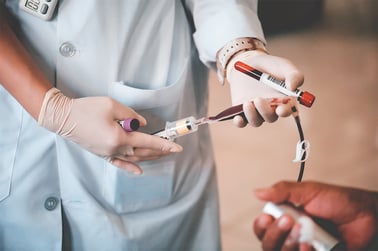Phlebotomy Program Curriculum
As a student in the phlebotomy program, you will learn the knowledge and skills necessary for critical jobs in the healthcare industry.
There are two courses in the phlebotomy program. Below, we'll give you a brief description of each course.
This course introduces the clinical laboratory and phlebotomy with the exploration of how these areas contribute to the health care system including history of phlebotomy, hospital organization, legal and ethical concerns in Healthcare, regulatory agencies and quality assurance, safety, and infection control. Medical terminology, anatomy of the cardiovascular system with the formation of blood and lymphatic system will also be explored.
This course explores the principles of phlebotomy and the advanced topics necessary to become certified and employed as a phlebotomist in the medical setting. Topics covered include anatomy and physiology of the circulatory system, equipment and supplies needed for venipuncture, the venipuncture procedure, pre-analytical errors, specimen processing, and capillary blood sample collection. This course also includes EKG testing, non-blood specimens, point of care testing (POC), and arterial puncture. Students complete 45 hours lecture/lab during the first 4 weeks of the semester and 120 hours of phlebotomy experience [clinical practicum] at a clinical affiliate agency during the last 3 weeks of the semester. Clinical settings can include physician offices, reference laboratories, STAT laboratories, hospitals, or other medical facilities.

